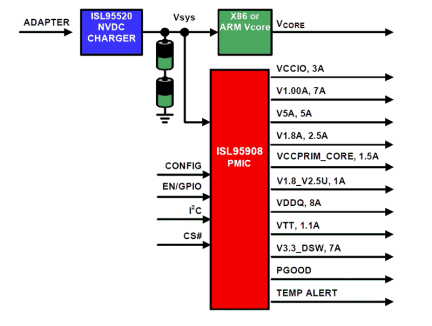Overview
Description
The ISL95908 is a Power Management Integrated Circuit (PMIC) for ultrabook, notebook, and tablet computers powered by 2-cell Li-ion batteries. It integrates control, MOSFET drivers, power MOSFETs, fault protection, and fault monitoring functions for eight highly efficient synchronous buck regulators and VTT LDO. It is offered in a thermally efficient 5.5mm x 5.5mm, 121-bump, 0. 5mm pitch WLCSP package. The PMIC regulators convert system voltage from the battery or adapter into all platform voltages needed for a typical computer system including 5V and 3.3V system regulators, 1.8V/2.5V, 1V, 0.975V, 0.9V for controller-hub, peripheral and core voltages, as well as programmable VDDQ and VTT regulators for DDR3/3U/3L, LPDDR3, and DDR4 voltages. The switching regulators operate at 1MHz and are based on Intersil’s proprietary R4™ Technology, which provides high light-load efficiency, fast transient response, seamless DCM/CCM transitions, and requires no external compensation. The PMIC provides overcurrent, overvoltage and over-temperature fault protections, and undervoltage and over-temperature warnings. A temperature alert signal indicates the PMIC is operating at an elevated temperature and ALERT indicates if any other fault or warning has occurred. The PMIC also offers significant I2C capability and can be configured to provide eight GPIO pins for additional system functionality and each regulator has an independent power-good indicator.
Features
- Highly integrated power management IC
- Efficient 1MHz integrated FET switching regulators
- Internal compensation, no external compensation
- Computer system platform voltage regulators 5V, 3.3V, 1.8V/2.5V, 1V, 0.975V, 0.9V
- Programmable VR3 and VTT regulators for memory (DDR3/L/U, LPDDR3, and DDR4)
- Extensive fault protection
- Overcurrent protection
- Over-temperature protection
- Overvoltage and undervoltage protection
- Temperature alert signal
- Independent power-good indicator for each regulator
- Independent enable signals for each regulator for maximum sequencing flexibility
- Low power consumption mode for connected standby
- I2C bus allows system fault monitoring, enable control, and configurable GPIO programming
- Output voltage offset programming through I2C
- Configuration pin provides additional system programming options
Comparison
Applications
Documentation
|
|
|
|
|---|---|---|
| Type | Title | Date |
| Datasheet | PDF 1.41 MB | |
| Datasheet - Short-Form | PDF 195 KB | |
| End Of Life Notice | PDF 603 KB | |
| Other | PDF 351 KB | |
| Other | PDF 366 KB | |
| Application Note | PDF 509 KB | |
| Application Note | PDF 397 KB | |
7 items
|
||
Design & Development
Models
ECAD Models
Schematic symbols, PCB footprints, and 3D CAD models from SamacSys can be found by clicking on products in the Product Options table. If a symbol or model isn't available, it can be requested directly from the website.

Product Options
Applied Filters:
